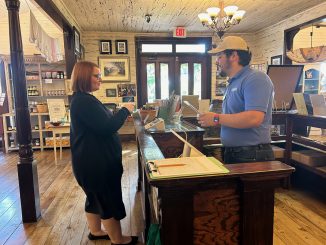
Topics include Katrina aftermath and immigration
Monday morning, U.S. Senator David Vitter addressed the River Region Chamber of Commerce at the LaPlace Quality Inn. In a room brimming with local business, industry and political leaders, Vitter’s speech dealt with the aftermath of Hurricanes Katrina and Rita and economic challenges to the River Parishes. Calling the address “a relaxed and informative” session, Vitter spoke on hurricane recovery and other national issues. After a brief address, he took questions from the audience.
“We are going to be dealing with hurricane issues for a long time; it’s going to be a marathon,” said Vitter. He recognized the River Parishes’ importance in this recovery, noting that St. Charles, St. John and St. James Parishes were used as staging areas to assist greater New Orleans. He also said that the River Parishes will play an essential part of the recovery effort, especially the heavy industry that currently resides in the area, such as petro-chemical and oil refining.
Vitter said that there are too few oil refineries in America and that the environmental obstacles prohibit opening more to meet national demands.
As for economic legislation regarding the river region, Vitter promoted the Gulf Opportunity Zones Act to fuel the recovery. The act uses tax incentives to get businesses rebuilding and relocating to the area through the project. He encouraged business leaders to inform others of the potential benefits of the program before it expires.
In the question session, River Region Chamber of Commerce Director Paul Aucoin encouraged Vitter to extend the act past the 2008 deadline, as projects currently approved for the incentive program must be completed in the two-year window. Aucoin said that is not always enough time, but added that he has received interest from many companies regarding the act. Vitter said he is hopeful to extend the GO Zone act.
Since insurance is regulated at state level, Vitter said he couldn’t do anything directly impacting rates, but he felt that the federal level could help with a better levee system, thus stabilizing rates or mitigating increases. “We need an upgraded hurricane protection plan,” he said. To pay for the plan, Vitter proposed releasing off-shore oil and gas revenues to fund the higher level of protection, along with wetland restoration.
Overall, though, he said insurance rates will likely increase in the future.
Vitter said that an overall upgrade must be done to levees throughout the region, not only those area that were extensively damaged during Katrina and Rita, such as St. Bernard or Plaquemines Parishes. He said that St. Charles remains vulnerable to storms and he was looking at ways to solve the crisis.
Another part of the recovery process that has troubled Vitter is the delay of the new flood maps from FEMA and the Army Corps of Engineers. While he said that they might be released in three weeks, he feels the delay has hindered redevelopment, as business and insurance companies are waiting to see where the new flood plains will be before investing.
On national issues, Vitter briefly spoke on the current immigration issue, saying that border security should be the first step, and then move on to related issues like work visas and tax issues. While he is open to debate on those elements of immigration, Vitter said he was against amnesty. “I have real reservations with that type of package,” he said. Citing an amnesty program that passed in the 1980s, Vitter said that amnesty is “a magnet encouraging more illegal immigration.”




Be the first to comment